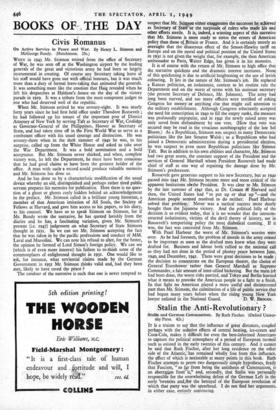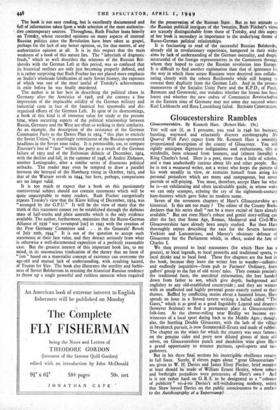Stalin the Anti-Revolutionary ?
IT is a truism to say that the influence of great distances, coupled perhaps with the sedative effects of central heating, ice-cream and Coca-Cola, makes it difficult for even the best-informed Americans to capture the political atmosphere of a period of European turmoil such as existed in the early twenties of this century. And it cannot be said that Ruth Fischer, after her long residence on the other side of the Atlantic; has remained wholly free from this influence, the effect of which is noticeable at many points in this book. Ruth Fischer attempts to prove two dangerously simple hypotheses, firstly that Fascism, so far from being the antithesis of Communism, is an aberration from" it," and, secondly, that Stalin was personally responsible for the overwhelming defeat of the German Left in the early 'twenties andifor the betrayal of the European revolution of which that party was the spearhead. I do not find her arguments, in either case, entirely convincing. The book is' not easy reading, but is excellently documented and full of information taken fzom a wide selection of the most authorita- tive contemporary sources. Throughout, Ruth Fischer leans heavily on Trotsky, whose recorded -opinions on many aspects of internal Russian politics since the Revolution have been taken as gospel, perhaps for the lack of any better opinion, or, for that matter, of any authoritative opinion at all. It is in this respect that the main weakness of a book of this nature lies. The " labyrinth of dogmatic feuds," which so well describes the relations of the Russian Bol- sheviks with the German Left at this period, was so confused that its historical outlines are only just becoming properly defined, and it is rather surprising that Ruth Fischer has not placed more emphasis on Stalin's wholesale falsification of early Soviet history, the exposure of which was one of the most useful of Trotsky's achievements in exile before he was finally murdered.
The author is at her best in desCribing the political chaos in Germany after the Armistice of 1918, and she conveys a fine impression of the implacable solidity of the German military and industrial caste in face of the fanatical but spasmodic and dis- organised efforts of the German Left. In spite of its shortcomings, a book of this kind is of immense value for study at the present time, when recurring aspects of the political relationship between Russia, Germany and the West are often so striking in their similarity. As an &le, the description of the resistance of the German Communist Party to the Dawes Plan in 1924,' this plan to encircle the Soviet Union," is startlingly reminiscent of the Russian-sponsored headlines in the Soviet zone today. It is permissible, too, to compare Zinoviev's loss of " face " within the party as a result of the Gernian failure of 1923 and of the Esthonian debacle of December, 1924, with the decline and fall, in the summer of 1948, of Andrei Zhdanov, another Leningrader, after a similar series of disastrous political setbacks. The reader may even be tempted to draw a parallel between the betrayal of the Hamburg rising in October, 1923, and that of the Warsaw revolt in 1944, but here, perhaps, comparisons are no longer valid.
It is too much to expect that a book on this passionately controversial subject should not contain statements which will be quite unacceptable to many readers. Ruth Fischer categorically repeats Trotsky's view that the Kirov killing of December, 1934, was "arranged by the- G.P.U." It will be the view of many that the truth, of this statement cannot yet be established through the dubious mass of half-truths and plain untruths which is the only evidence available. The author, furthermore, maintains that the Russo-German Alliance of 1939 " was revamped [sic] in 1943 with the creation of the Free Germany Committee and . . . in the Generals' Revolt of July zoth, 1944." It is out of the question to accept such statements at their face value, and they detract seriously from what is otherwise a well-documented exposition of a perfectly reasonable case. But the greatest interest of this important book lies, to my mind, in its unconscious vindication of the theory that no form of "ism" based on a materialist concept of existence can overcome the age-old and mutual lack of understanding, with resulting hatred, of Teuton for Slay. The book also illustrates the sterility and feeble- ness of Soviet Bolshevism in resisting the historical Russian tendency to throw up a single powerful and ruthless autocrat when required
for the preservation of the Russian State. But in her attitude to the Russian political intrigues of the 'twenties, Ruth' Fischer's viewi are scarcely distinguishable from those of Trotsky, and this aspect of her book is secondary in importance to the underlying theme of Russo-German political relationships.
It is fascinating to read of the successful Russian Bolsheviks, already old in revolutionary experience, hampered in their wider aims by lack of understanding of the German mentality, and deeply mistrustful of the foreign representatives in the Comintern through whom they hoped to carry the Russian revolution into Europe. It is difficult to find another explanation than that of ignorance for the way in which-these astute Russians were deceived into collabo- rating closely with the reborn Reichswehr while still hoping to conceal their duplicity from the German Left. And in the present manoeuvres of the Socialist Unity. Party and the K.P.D., of Pieck, Reimann and Grotewohl, one wonders whether the lesson has been learnt and whether the new cadres of Communist Bereitschaf ten in the Eastern zone of Germany may not some day succeed where Karl Liebknecht and Rosa Luxemburg failed. RIC:HARD CHANCELLOR.







































 Previous page
Previous page